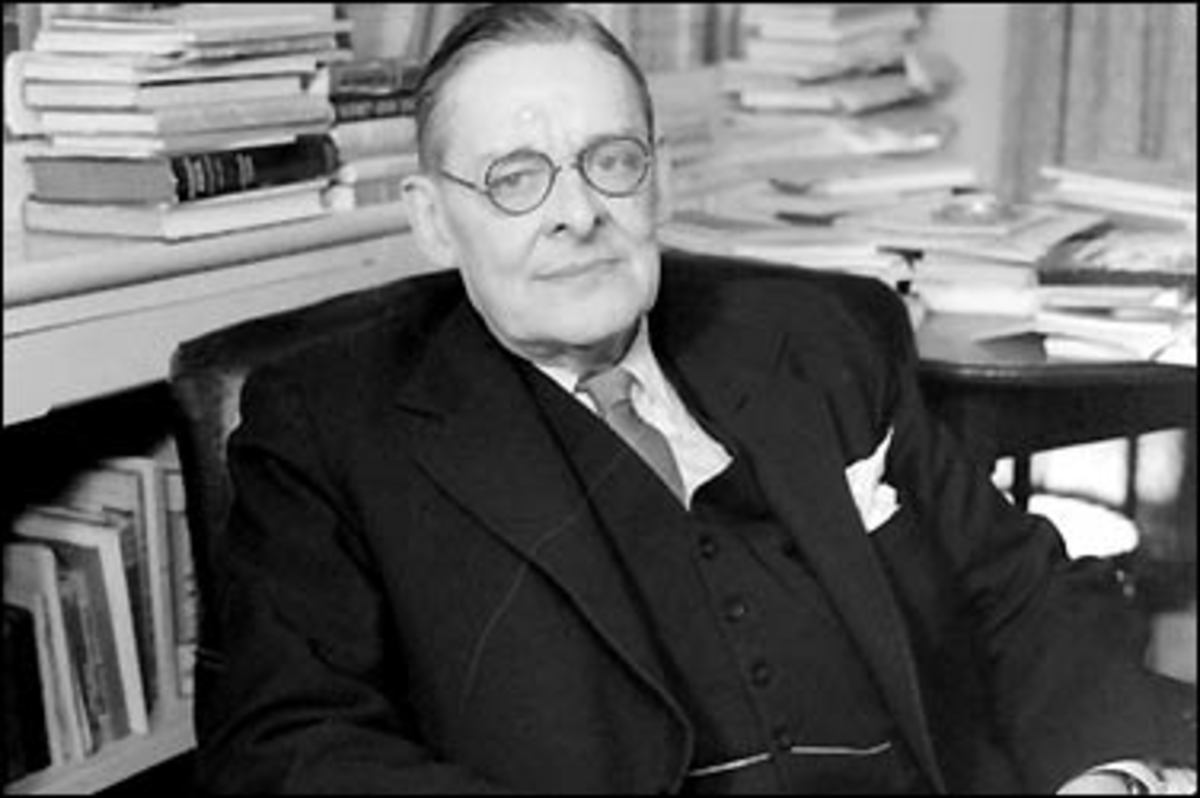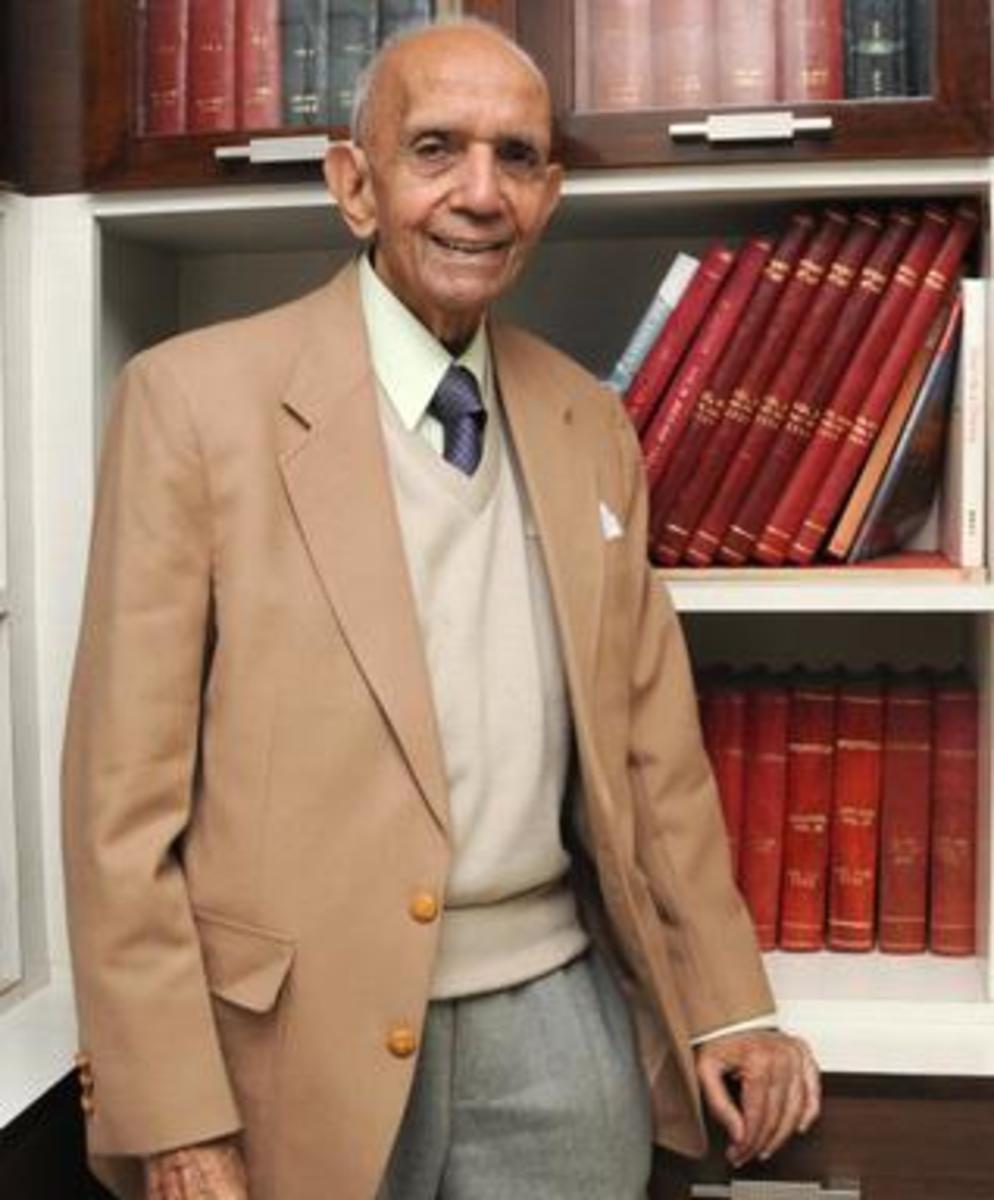T.S. Eliot's Song for Simeon
A Man Who Has 'Sickness Unto Death'
In T.S. Eliot's poem, A Song for Simeon, Eliot addresses spiritual angst and the plight of modern man. As with Eliot’s other poetry, nothing is idealistic. Far from being a reassuring poem of the fruits which come from a life of spiritual faithfulness, Eliot juxtaposes Biblical imagery against the condition of the modern man. The result is a tense admixture which combines fatigue and rest, hope and despair, redemption and expulsion.
The poem is based around the account of the elderly Simeon found in Luke 2:25-35. A just and devout man, the Lord had promised to Simeon that he would see the “consolation of Israel” (2:25). When Mary and Joseph brought Jesus to the temple, and Simeon saw the baby, the Holy Spirit overcame him and he broke into prophetic song:
Lord, now lettest thou thy servant depart in peace, According to thy word. For mine eyes have seen thy salvation,which thou hast prepared before the face of all people, A light to lighten the Gentiles,and the glory of thy people Israel"
But Simeon’s prophecy was not limited to the praise of God and the promise of a great kingdom. It included a distressing promise: “Behold, this child is set for the fall and rising again of many in Israel; and for a sign which will be spoken against; (Yea, a sword shall pierce through thy own soul also).” Simeon concludes his prophecy by declaring that this child will cause the innermost thoughts of many hearts to be revealed, exposing the true character of the inner man.
The song and subsequent declaration of the Biblical Simeon is oxymoronic. The Greek word which is translated ‘consolation’ is paraklesis, which indicates a calling to comfort and encouragement (Zodhiates 1718). The implication of Simeon’s song is that Jesus is the the comfort of mankind, but will result in tumult and tribulation. This distress was not limited to Jesus’ family. His life brought earthly pain and suffering upon all those who loved him most dearly. Before his crucifixion, Christ warned his disciples that the suffering would not only continue, but also become more intense:
Then shall they (the nations) deliver you up to be afflicted, and shall kill you: and ye shall be hated of all nations for my name’s sake. And then shall many be offended, and shall betray one another, and shall hate one another (Matt 24:9-10).
It is a small wonder that Simeon prayed that God would let him “depart in peace”. Who wants such pain? But the Biblical Simeon was a man of genuine faith. His request to “depart in peace” depicts the joy and satisfaction of a great man of faith who has completed all that God had in store for him.
The singer in Eliot’s poem is one who likens himself as a type of Simeon, but who lacks the faith of the Biblical Simeon. Like Simeon, he is old and near death. Eliot portrays him as one who “who has eighty years and no to-morrow”. But unlike the Biblical Simeon, Eliot’s Simeon despairs of life:
I am tired with my own life and the lives of those after me,/ I am dying in my own death and the deaths of those after me.
Eliot’s minstrel despairs from a terrifying imperative which results from coming face-to-face with the consolation of God: Faith requires a wholehearted devotion to God, but every fibre of the human condition screams against genuine faith. To obtain faith, one must surrender every rational claim to life, including freedom and even life itself. For the person who has not made the complete surrender of faith, the requirement of faith is absurd. The result of the absurd is crisis for the one who encounters the consolation of God.
This is the setting of A Song for Simeon: Eliot’s singer is a modern man in his moment of spiritual crisis. He understands he must make the leap to faith, but believes that the required plunge into the absurd will result in even greater misery and distress. Simeon longs to be free of the crisis, and shrinks back from the requirement of faith. This results in despair: The Eliot’s Simeon does not want to be part of the self that recognizes the absurd, nor does he want to be part of the God who created the intolerable crisis. His only solution is to beg for an annihilating death to free him.
Eliot’s poem is best understood as a work of Christian existentialism inspired by Kierkegaard’s works. According to Kierkegaard, true faith requires that one defy any and all empirical claims of reality, and boldly chose a faith which lies outside of the physical realm. Writing under the pseudonym of Johannes Climacus, he explains that the incarnation of Christ is the root cause of absurdity:
What is the Absurd? The absurd is that the eternal truth has entered time, that God has entered existence, has been born, has grown, and so on, has become precisely like any other human being, quite indistinguishable from other humans. The absurd is precisely by its objective repulsion the measure of inward faith...
Christianity has declared itself to be the eternal that has entered time, that has proclaimed itself as a paradox, and demands faith’s inwardness in relation to that which is a scandal to the Jews, folly to the Greeks, and absurd to the understanding. It is impossible to say this more strongly than by saying: subjectivity is truth, and objectivity is repelled by it - by virtue of the absurd (Kierkegaard, Concluding, 934)
For Kierkegaard, the entrance of the Divine into human affairs creates crisis because God’s manifest presence requires a response from each individual. The response required is ‘faith’ which is beyond human description, understanding, or standards of ‘proof’ so highly valued in modernity. In the case of Eliot’s Simeon, the faith that is required is the trust and belief that God is good. If “the time of cords and scourges and lamentations” manifests itself, Eliot’s Simeon will be able to endure because of vibrant faith. However he currently lacks such faith and stands at the precipice of the absurd.
In Fear and Trembling, Kierkegaard’s nom de plume, Johanne de Silentio, marvels at Abraham who was willing to sacrifice his only son because God required it. There was no empirical basis for Abraham to know that this was, in fact, God’s command. De Silentio’s crisis results from the recognition that he does not possess the level of faith which was demonstrated by Abraham and required of all who truly believe:
I have seen the dreadful before my own eyes, I do not flee from it timorously, but I know very well that, although I advance to meet it, my courage is not the courage of faith, nor anything comparable to it. I am unable to make the movements of faith, I cannot shut my eyes and plunge confidently into the absurd, for me that is an impossibility...but I do not boast of it (Kierkegaard, Fear and Trembling, 414)
In a similar manner, Eliot’s Simeon recognizes his own lack of faith. He desires God’s peace, but he is unable to reach the point of faith which will enable him to receive it by embracing the absurd. He asks that God spare him from “the ultimate vision” of martyrdom and the pain and suffering which the Christian life brings. However he wants to retain the warmth of good feelings for being an ethical man, one who “kept faith and fast”, who “provided for the poor”, and who made sure that “there went never any rejected from my door”. Like Climacus and De Silentio, Eliot’s character can see what is required, and marvel at its power, but none can muster the courage required to grasp faith.
Because Simeon has not plunged into the absurd, he can only perceive terror as a consequence of the Christian life. Haunting imagery of destruction and death overwhelm the poem: He sees himself as too frail to withstand the storms of life. His life is “light, waiting for the death wind/ like a feather on the back of my hand”. Ultimately he believes the wind will blow his emaciated life “toward the dead land”. His focus is on “the time of cords and scourges and lamentation”, and imagines his descendants being driven from their homes by foreign oppressors. These images show that Eliot’s Simeon holds a fatalistic view of God. The Modern Simeon does not understand the righteousness of God, which empowered saints such as Abraham (and the Biblical Simeon) to courageously embrace life through faith, empowered by the experience of knowing a good God. Eliot’s Simeon has seen God’s salvation, and chooses to turn away from it.
The moment Eliot’s Simeon shrinks away from faith, he is struck with what Kierkegaard calls a “sickness unto death”. Writing under the pen name Anti-Climacus, Kierkegaard asserts that despair causes a grave illness to overtake every person outside of the true faith:
There lives not one single man who after all is not to some extent in despair, in whose inmost parts there does not dwell a disquietude, a perturbation, a discord, and anxious dread of an unknown something, or of a something he does not even dare to make acquaintance with, dread of a possibility of life, or dread of himself... this man is going about and carrying a sickness of the spirit, which only rarely and in glimpses, by and with a dread which to him is inexplicable, gives evidence of its presence within... (Kierkegaard, Sickness Unto Death)
While he prays that God allow him to die in peace, the sickness present in Simeon forbids this very possibility. ‘Despair’ results in a state of despair in a similar way that ‘sin’ leads to a state of sinfulness (Storm). Like sin, despair attacks the soul of the man, not the body. The soul is eternal in nature, therefore the illness that attacks it is also eternal:
If one might die of despair as one dies of a sickness, then the eternal in him, the self, must be capable of dying in the same sense that the body dies of sickness. But this is an impossibility...The despairing man cannot die” (ibid)
Eliot’s Simeon contracted the “sickness unto death” when he saw the Christ child, but could not bring himself to embrace the faith which was demanded by mere presence of the Messiah in the fallen world.
His state remains one of paradox: Simeon has “the sickness unto death”, but it won’t lead to death. Simeon prays to “depart in peace” but the request cannot be granted because a state of enmity exists between Simeon and God due to Simeon’s belligerence: The only reason why Simeon requests that he “depart in peace” is because he is unwilling to meet the requirement of faith set forth by God. But ultimately the paradox most devastating to the Modern Simeon is the haunting images of suffering: Because Simeon has shrunk from faith, he shouldn’t be consumed with fear. The tribulation and martyrdom he most fears is only visited upon the faithful, a category to which he does not belong. Simeon’s only solution to the dilemma is to accept the requirements of faith. Once he does this, he will have faith as powerful as Abraham’s (and the Biblical Simeon) which will enable him to endure and persevere through the inevitable persecution and hardships. But to choose this solution is to embrace the absurd.
Work Cited
Kierkiergaard, Soren. "Concluding Unscientific Postscript."Classics of Philosophy. Ed. Louis P. Pojman. 2nd. New York: Oxford University Press, 2003. 926-934. Print.
Kierkegaard, Soren, and Walter Lowrie, Trans. “Fear and Trembling.” Great Books of the Western World, Vol 43. Ed. Mortimer J. Adler. Chicago: Encyclopedia Britannica, 1993. Print.
Kierkegaard, Soren. The Sickness Unto Death. OS Book, 2012. Amazon.com. Kindle eBook. 25 July 2012.
Storm, D. Anthony. "Fifth Period: Direct Communication, 1848-51, Sickness Unto Death." Commentary on Kierkegaard. D. Anthony Storm, n. d. Web. Web. 25 Jul. 2012.
Zodhiates, Spiros. “Lexicon to the Old and New Testaments.” The Hebrew-Greek Key Study Bible: King James Version. Ed. Spiros Zodhiates. Chattanooga, TN: AMG Publishers, 1984. Print.








